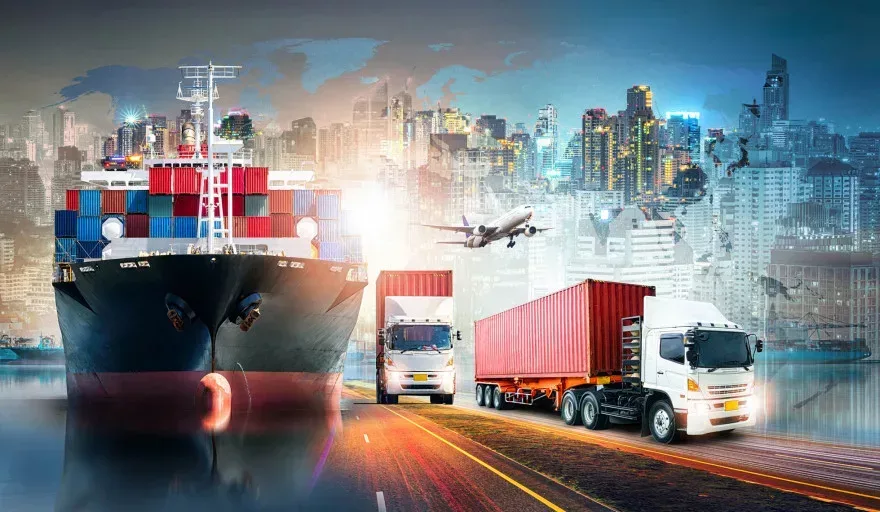From Nigeria to Southern Africa, the logistics industry is essential to the success of pan-African industry.
LOGISTICS ACROSS THE AFRICAN CONTINENT
Globally, logistics is essential to the smooth operation of industries across the board.
The transportation of goods and resources, whether by means of land, sea or sky, is a necessary part of the way business functions, and a critical aspect in the import, export and trading capacity of regions and nations worldwide.
In the US for example, a vast landmass containing multiple landlocked states, 74 percent of freight is made up of land-based and trucking transport, while rail and water make up 11 and five percent respectively.
Present day logistics has evolved a lot, even since the last decade. Technological solutions and continual advancements have given rise to many new innovations in the fields of transport, organisation and communication. Examples such as the switch from fossil-fuels to electric and hybrid vehicles, AI systems and automated control, high-level connectivity come to the fore of thought. Temperature controlled logistics is another crucial development in the sphere. The ability to store, preserve and transport sensitive cargo, such as food stuffs or pharmaceuticals, has been game changing; not to mention crucial in the past year.
Across Africa, logistics is a vital element to the continuation and growth of national and continental GDP as well as livelihoods.
A prime example of this is the forestry industry in East Africa. The region is home to a large portion of the greater continent’s logistics, supply chain and shipping sectors. In the forestry industry, a mixture of rough terrain and the requirement of specialised industry equipment leads to a stable and reliable supply chain and logistics being one of the most vital elements to operational success.
In this industry, raw materials for electrification and construction projects lead to the critical need for the fluid and practical transportation of such resources and equipment. Not only is rough terrain transport and freight a necessary and skilled line of work, the necessity for such an element of industry work has formed a source of job provision for communities in rural areas of the East African region.
Southern African mining sees a similar necessity in freight and logistics. Within the manganese mining sector for example, South Africa has managed to cement itself as a global leader in manganese production, providing and sourcing over 80 percent of the resource across the globe.
When we look towards the start of the 21st century, South African manganese exportation reached approximately eight million tonnes annually, and as of last year, this increased to around 20 million tonnes. In the manganese sector the mixture of increased digitalisation; the aforementioned advancement of organisation, communication and connectivity, allow us to see how far operations have come, and how much further they can evolve.
Certainly, for the Southern African mining sector partner and supplier relationships relating to services such as crushed ore transport, drilling equipment provision and resource freight are critical to continued and fluid operation. This inter-continental monopoly on manganese extraction and provision would not be possible without the reliable logistical efforts that transport the product and perform other necessary roles, and in this way logistics can be arguably considered one of the biggest elements of the mining industry – without it, companies would lack the capability to export materials to their customers.
To the west of the continent, Nigerian logistics has fluctuated in the past decade.
The recession cycle of 2014 to 2016 caused disruption and decline in the sector. Yet after this, the nation’s industry was one of the fastest growth sectors of the economy, with its 2018 value estimated at ₦250 billion ($694 million).
Following the surge of revenue leading up to 2020, the sector was hit hard by the impact of the COVID-19 pandemic, and there followed a resulting temporary decline while countries across the world got to grips with new restrictions and health and safety laws and guidelines.
Currently the mixture of COVID-19 related challenges and a need for increased infrastructure is causing challenges for the growth of logistical operations, nevertheless it is a vital aspect to Nigerian operations.
Rivers State is a region of Nigeria known for its industry. Its capital, Port Harcourt, includes two major seaports (in Onne and Port Harcourt Port) from which the nation provides import and export shipping internationally, and which are a vital element to Nigeria’s logistical operations. From this individual area the city connects itself to multiple eastern regions of the nation, and this system has become an important gateway into major markets, both domestic and regional.
These eastern regions of Nigeria are renowned for their oil and gas sectors; a critical commodity delivered to locations across the globe; a large contributor to Nigerian wealth, and one of the many impacted by COVID-19.
Felt all over the world, and in Africa, the logistics industry has weathered the impact of the pandemic when many others have struggled to. Due to their necessity, many logistics companies have been allowed to continue their operation throughout the government-imposed lockdowns in multiple countries.
Now, with mass vaccine rollouts becoming increasingly available across the continent and the globe, the African logistics industry is at the forefront of driving transport and delivering industry success into the future.



























